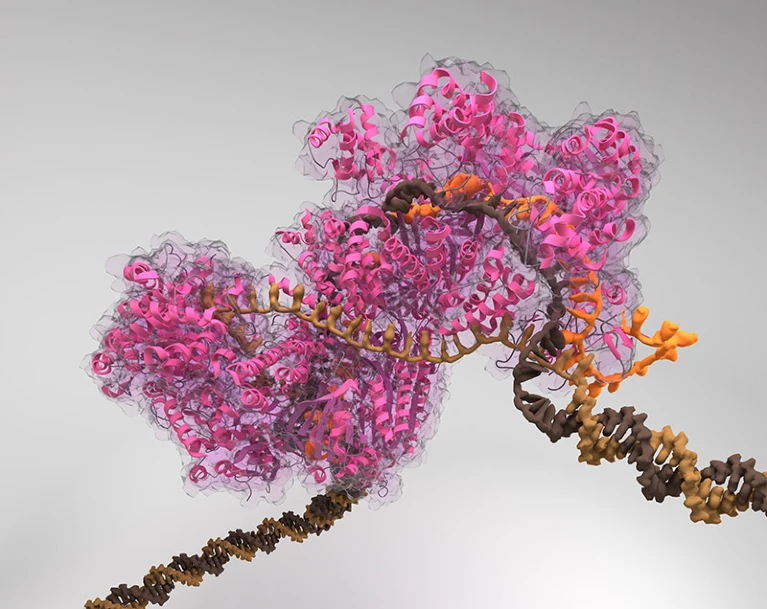
The CRISPR-Cas9 editing system (artist’s impression) for experimental treatments. Credit: Biolution GmbH/Science Photo Library; see https://www.nature.com/articles/d41586-023-03797-7
Nonetheless, progress is still being made on many fronts. If anything, 2023 produced a bumper crop of startling new advances, particularly in health, medicine, physics, astronomy, computer science and artificial intelligence. Many of these advances, in turn, are based on the unstoppable forward march of Moore’s Law and computer technology — since 2000, aggregate memory and computer power of comparable devices have increased by factors of approximately 1,000,000. Genome sequencing technology has advanced even faster — sequencing a full human genome cost $3 billion in 2003, but currently costs only about $300, a 10,000,000-fold reduction.
Further, contrary to popular perception, progress has also been made in several metrics of social well-being. For example, after rising worldwide during the Covid-19 pandemic, crime rates fell sharply in most major cities in 2023. And global poverty continues its remarkable decline, with over 100,000 persons escaping dire poverty per day (on average) since the 1980s.
Granted, as emphasized above, progress has certainly not been universal, and many dire challenges remain, but we should not lose sight of the progress that has been achieved. Here are just a few of the many items of progress worth celebrating, most of them in the past year (2023). Numerous others are listed HERE, from which part of the items below were gleaned.
Health and medicine
- Sickle cell CRISPR ‘cure’ is the start of a revolution in medicine.
- WHO announces drop in malaria infections, deaths after vaccine rollout.
- India witnessed 85.1% decline in malaria cases & 83.36% decline in deaths during 2015-2022.
- Genetically modifying T-cells cuts blood cancer progression by 74%, trial finds.
- Lung cancer pill cuts risk of death by half, says ‘thrilling’ study.
- Huge leap in breast cancer survival rate [English women diagnosed in 1993–99 had a 14.4% risk of dying within 5 years; this fell to 4.9% for women diagnosed in 2010–15].
- Some deaf children in China can hear after gene therapy treatment.
- CRISPR gene editing shown to permanently lower high cholesterol.
- CRISPR 2.0: a new wave of gene editors heads for clinical trials.
- Kenya achieves remarkable 68% decline in AIDS-related fatalities.
- ‘A great day for the country’: Uganda declares an end to Ebola outbreak.
- FDA approves first vaccine for RSV, a moment six decades in the making.
- A new class of drugs for weight loss could end obesity.
- Drug startup aims to cure blindness by developing medications in space.
- Moderna’s mRNA cancer vaccine works even better than thought.
- US life expectancy rebounded in 2022 but not back to pre-pandemic levels.
Artificial intelligence, computer science and mathematics
- DeepMind AI creates algorithms that sort data faster than those built by people.
- A.I. Is Coming for Mathematics, Too.
- New AI translates 5,000-year-old cuneiform tablets instantly.
- The race of the AI labs heats up.
- Nvidia predicts AI models one million times more powerful than ChatGPT within 10 years.
- Teachers and students warm up to ChatGPT.
- AI Reduces Timescale of Early Drug Development to Weeks.
- To Teach Computers Math, Researchers Merge AI Approaches.
- A Very Big Small Leap Forward in Graph Theory.
- Hobbyist Finds Math’s Elusive ‘Einstein’ Tile.
Astronomy, physics and cosmology
- Amazing images from James Webb telescope, two years after launch.
- The Cosmos Is Thrumming With Gravitational Waves, Astronomers Find.
- JWST Discovers Enormous Distant Galaxies That Should Not Exist.
- Mirror-Image Supernova Yields Surprising Estimate of Cosmic Growth.
- Dark Matter Hunters Need Fresh Answers.
- A New Experiment Casts Doubt on the Leading Theory of the Nucleus.
- The Story of Our Universe May Be Starting to Unravel.
- A Possible Crisis in the Cosmos Could Lead to a New Understanding of the Universe.
- The Early Universe Was Bananas.
Conservation and the environment
- Genome Editing Used to Create Disease Resistant Rice.
- Scientists Unlock Key to Drought-Resistant Wheat Plants with Longer Roots.
- Climate change: Fossil fuel emissions from electricity set to fall.
- Bhutan announces a “milestone achievement” with a 39.5% increase in snow leopard numbers.
- Tiger populations grow in India and Bhutan.
Crime, poverty and social equity
- After Rise in Murders During the Pandemic, a Sharp Decline in 2023.
- The Post-Pandemic Murder Wave Is Cresting.
- Crime falls to lowest level on record, ONS [UK’s Office for National Statistics] says.
- March 2023 global poverty update from the World Bank [global poverty, namely US$2.15 per person per day or less in 2017 dollars, has declined from 38% of world population in 1990 to 8.5% in 2023].
- U.S. Approval of Interracial Marriage at New High of 94% [in 1958, only 4% of Americans approved of marriage between Black and White people; in 2023, 94% approved].
- 6 ways the lives of girls are different today than they were a decade ago [more education, fewer pregnancies, fewer HIV infections, fewer child marriages and more].
- Progress on girls’ access to education [50 million more girls have been enrolled in school globally since 2015].